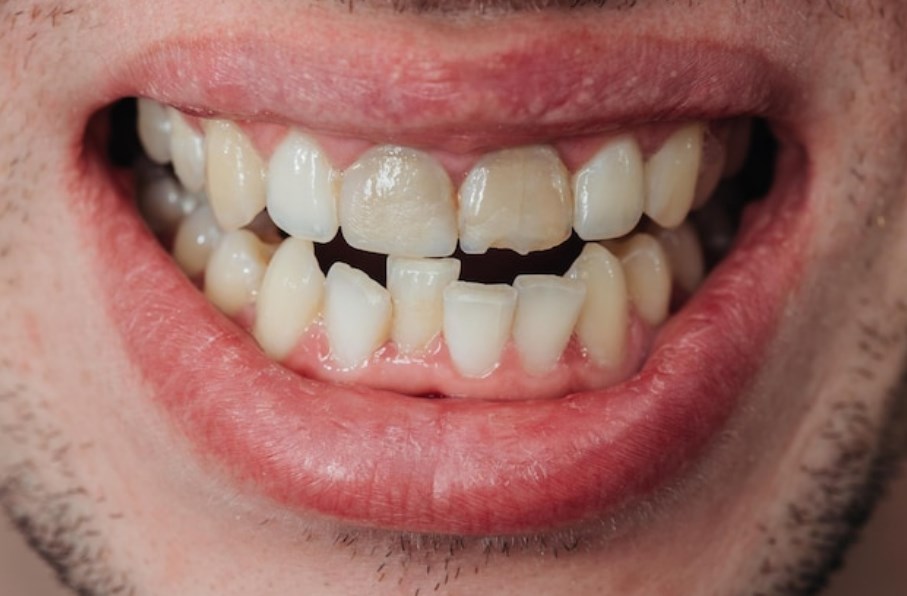A chipped tooth may seem like a minor inconvenience at first—something you could easily ignore and hope will eventually be forgotten. But what if I told you that a small chip in your tooth could actually lead to a domino effect, setting off a chain reaction of dental and health problems that could be far more serious than you originally imagined?
A small break in a tooth can trigger significant issues over time, affecting your smile, your bite, and even your overall health. Let’s explore how one seemingly insignificant dental issue can lead to a string of complications, and why it’s crucial to address even the tiniest chips as soon as possible.
How Can a Small Chipped Tooth Lead to More Serious Dental Issues?
A chipped tooth, though often caused by something as simple as biting down on a hard piece of food or an accidental knock, can quickly escalate into something much more significant.
At first glance, the chip may seem harmless—a small dent or crack on the surface of your tooth. However, what you may not realize is that this seemingly insignificant issue can lead to a cascade of more serious dental problems. Here’s how:
- Exposed Nerves: Depending on the severity of the chip, it could expose the sensitive nerves inside the tooth. When this happens, even the slightest contact, like drinking hot or cold beverages, can cause intense pain. The longer this is left untreated, the more likely it is to lead to an infection that could spread deep into the tooth or surrounding tissues.
- Increased Risk of Decay: A chip in your tooth creates an opening for bacteria to invade. The rough edges of the chip can trap food particles, providing an ideal environment for plaque and tartar to build up. This increases the risk of tooth decay, which can, over time, weaken the structure of your tooth and cause larger cavities.
- Tooth Sensitivity: Even a small chip can lead to increased tooth sensitivity. The edges of the chip might expose dentin, the softer tissue beneath the enamel. Over time, this sensitivity can become more pronounced, making it difficult to eat or drink without discomfort. If left untreated, this issue can worsen, eventually leading to more extensive dental procedures.
- Weakening of the Tooth Structure: A chipped tooth is inherently weaker than an intact one. If you continue using that tooth for chewing without seeking treatment, the pressure could cause further damage, possibly resulting in a larger crack or break that could require more invasive dental procedures, like root canals or crowns.
In essence, while a chipped tooth may seem trivial at first, the potential for complications grows over time. Ignoring a small chip is like ignoring a small leak in your roof—it’s only going to get worse the longer you leave it unattended.
What are The Long-Term Risks of Ignoring a Chipped Tooth?
Ignoring a chipped tooth may seem like a minor issue, but over time, it can lead to significant dental and overall health concerns. If you don’t seek treatment for a chipped tooth, you could be inviting a host of long-term complications that could cost you more in both time and money down the road.
Here are some of the risks of letting a chipped tooth go untreated:
- Infection and Abscesses: When a chip exposes the inner layers of the tooth, it can lead to bacterial infection. This infection, if untreated, can progress to an abscess, which is a pus-filled pocket that can form in the gum tissue or at the root of the tooth. Abscesses are not only painful but can also cause severe health complications, including bone loss and the spread of infection to other areas of the body, such as the bloodstream.
- Tooth Loss: A chipped tooth that is not properly repaired can weaken over time. If the chip continues to grow or the tooth becomes more fractured, you may eventually lose the tooth altogether. In some cases, if the damage extends to the root, extraction may be necessary. Losing a tooth can affect your smile, your confidence, and your ability to chew properly.
- Jaw Problems: A chipped tooth can also affect how you bite and chew. If the chip alters the way your teeth come together, it can put uneven pressure on your jaw, leading to jaw pain, temporomandibular joint (TMJ) disorder, and muscle tension. Over time, this can create a cycle of discomfort and dysfunction that can be difficult to correct.
- Complicated Restorative Treatments: If you leave a chipped tooth untreated for too long, the damage may become more severe, requiring more complex and expensive treatments. What could have been a simple cosmetic bonding procedure could turn into a need for root canals, crowns, or even a dental implant.
- Cosmetic Issues: If the chip is on a visible tooth, it can quickly affect your appearance. A chipped tooth may not only be painful and uncomfortable, but it can also be a cosmetic concern. Over time, the chip could worsen, leading to further aesthetic concerns that may require more significant and costly cosmetic dental work.
While a chipped tooth may not seem like a pressing issue, the long-term risks of neglecting it can be detrimental to both your oral health and your overall well-being.
How Does a Chipped Tooth Affect Surrounding Teeth Over Time?
You may be wondering, “Why does a small chip in one tooth matter for the rest of my teeth?” The answer lies in the way our teeth work together to support each other and our bite.
Over time, a chipped tooth can have a ripple effect on your surrounding teeth. Here’s how:
- Shifting of Teeth: A chipped tooth can cause the surrounding teeth to shift or become misaligned. When one tooth becomes weaker or out of place, it can throw off the balance of your bite, forcing other teeth to compensate. This misalignment can lead to uneven wear and tear, which may damage other teeth in the long run.
- Increased Pressure on Other Teeth: If the chipped tooth is no longer doing its fair share of the work, your other teeth may have to pick up the slack. This can place extra pressure on the surrounding teeth, leading to potential fractures, cracks, or even tooth loss in the future.
- Uneven Wear: If you continue to chew or bite using a chipped tooth, it may cause uneven wear on your surrounding teeth. This could lead to premature enamel erosion, sensitivity, or damage to those teeth as well. The domino effect of a chipped tooth can gradually wear down your entire bite if left untreated.
- Gum Recession: The chip could create an opening between the tooth and the gum line, leading to gum recession. This can expose more of the tooth’s root, making it more vulnerable to decay and sensitivity. If left unchecked, this can create a cycle of worsening oral health for multiple teeth.
Simply put, a small chip in one tooth can have a domino effect on your entire dental structure. Ignoring that small chip could eventually lead to bigger, more expensive problems across multiple teeth.
Why is Early Treatment Important For Preventing Complications From a Chipped Tooth?
The key to preventing the domino effect from happening is early intervention. Taking action as soon as you notice a chipped tooth is critical to avoiding long-term complications and maintaining your overall dental health.
Here’s why early treatment is so important:
- Preventing Further Damage: The sooner you address a chipped tooth, the less likely it is that the damage will spread. What could be a simple bonding procedure to fix a small chip could turn into a root canal if the chip is left untreated for too long. Early treatment prevents more complex and costly procedures in the future.
- Preserving Tooth Structure: Treating a chipped tooth early helps preserve as much of the tooth’s natural structure as possible. The longer you wait, the more likely you are to lose part of the tooth, which can lead to more complicated restorative treatments, like crowns or implants.
- Reducing Pain and Discomfort: A chipped tooth can cause discomfort or sensitivity, especially if the nerve is exposed. Early treatment can relieve this pain and prevent more severe issues from arising.
- Maintaining Your Smile and Confidence: A chipped tooth, especially if it’s visible, can affect your smile and self-esteem. Addressing the issue promptly will help you maintain your confidence, preventing you from worrying about a damaged tooth every time you smile or speak.
- Avoiding Additional Health Risks: As previously mentioned, a chipped tooth can expose you to infections, abscesses, and other serious health risks. Seeking treatment early minimizes the chance of these complications occurring.
The bottom line is that a chipped tooth, no matter how small, should never be ignored. Early treatment is essential to preventing a chain reaction of dental issues and maintaining your long-term oral health.
While a chipped tooth may seem like a minor concern at first, the consequences of leaving it untreated can be far-reaching. From exposing you to infections to affecting the surrounding teeth, the domino effect of a small chip can lead to bigger, more costly dental issues down the road.
The good news is that by seeking early treatment, you can prevent these complications and preserve your smile, comfort, and health. So, if you’ve chipped a tooth, don’t wait—schedule an appointment with your dentist today and keep that small problem from turning into a big one!
Don’t Let a Small Chip Become a Big Problem – Schedule Your Dental Appointment Today!
A chipped tooth might seem insignificant now, but don’t let it lead to bigger, more expensive issues down the road. Our team at River District Dentistry Smiles is here to help restore your smile and prevent the domino effect of dental complications.
Take action now and get the care you need to protect your oral health for years to come. Book your appointment today, and let’s keep your teeth in top shape!


